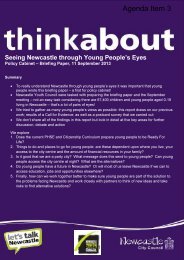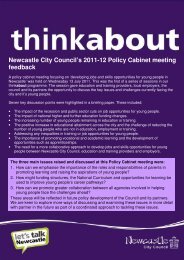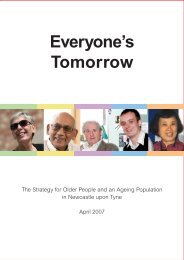NEWCASTLE'S MUSICAL HERITAGE AN INTRODUCTION By ...
NEWCASTLE'S MUSICAL HERITAGE AN INTRODUCTION By ...
NEWCASTLE'S MUSICAL HERITAGE AN INTRODUCTION By ...
You also want an ePaper? Increase the reach of your titles
YUMPU automatically turns print PDFs into web optimized ePapers that Google loves.
perhaps honesty is not always the best policy. It was the march, however, that<br />
allegedly inspired the poet, Browning to immortalise Avison in his ‘Parleyings with<br />
Certain People of Importance in Their Day’. published not long before the poet’s<br />
death. The following quote from the work appears on Avison’s gravestone: -<br />
“On the List<br />
of worthies who by help of pipe or wire<br />
expressed in sound Rough Race or Soft Desire<br />
Thou Whilom of Newcastle Organist”<br />
Today, Charles Avison ranks alongside the best of his English contemporaries<br />
and could undoubtedly have had a more distinguished career had he courted<br />
success, yet in spite of not doing so his legacy lives on. He still retains a certain<br />
distinction for an outsider; an uncompromising provincial musician, in that he<br />
continues to have articles written about him and is referred to and discussed in<br />
most of the leading musical dictionaries and encyclopaedias as well as in other<br />
critical musical publications. Having said all that there still remains that nagging<br />
feeling that he is being denied his rightful place in the roll of honour of 18 th<br />
century English musicians. But before we explore this let us have a closer look at<br />
the tenuous link between Avison and Browning – these two men who lived their<br />
lives one hundred years apart.<br />
Why should Avison from Newcastle have appealed so much to Browning, who<br />
hailed from Dorset It is generally accepted that the little march attributed to<br />
Avison which Browning is said to have found in his mother’s papers after her<br />
death, inspired him to include the composer in his ’Parleyings’ but in fact<br />
Browning must have heard other music by Avison if, as is alleged, he loved him<br />
so much. (He even contributed towards a new headstone for Avison) One<br />
explanation is that as a young man Browning took musical instruction from John<br />
Relfe (1763–1837) organist, English musical theorist and composer. Relfe<br />
composed sonatas amongst other things and perhaps because of this and the<br />
fact he was a fellow church organist, he would have been aware of Avison and<br />
his compositions, some of which were published in London, and through Relfe,<br />
Browning was introduced to Avison’s works. Through Relfe, Browning also<br />
acquired knowledge of music theory and composition and as a literary man<br />
(although long in doubt whether he should not become a musician) would no<br />
doubt have acquainted himself with Avison's musical criticisms etc. Browning<br />
wrote his ‘Parleyings’ when he was seventy three years old and in a sense it is a<br />
summary of his career in that it is full of reminiscences and deals with men<br />
whose works connected themselves with his own intellectual sympathies and<br />
imaginative pleasures of his early youth. On dealing with Avison, whom it seems<br />
Browning had loved as a boy, he wonders whether Avison’s music is as dead as<br />
the winter landscape before him (as he gazed into the early spring garden) ‘Once<br />
it had captivated audiences and seemed perfect yet now when one has become<br />
accustomed to the complicated harmonies of Wagner, Brahms and Liszt it seems<br />
so simple. It no longer has the power to shine as it once had’. Browning explains<br />
14

















